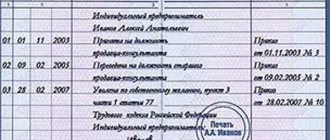Is it possible to fire an employee for failure to perform official functions?
An exhaustive list of reasons why an employer has the right to terminate an employment contract with an employee is prescribed in Art. 81 Labor Code of the Russian Federation. Moreover, among the specified grounds there is no such item as failure to fulfill the sales plan. From this we can conclude that management cannot part with an employee for such a reason. However, a completely different approach is applied to personnel for whom fulfilling the sales plan is a direct labor responsibility.
So, in accordance with clause 5, part 1, art. 81 of the Labor Code of the Russian Federation, the employer has every right to dismiss an employee who does not fulfill his job duties . However, to initiate the dismissal procedure, the following conditions must be met:
- the need to fulfill the sales plan must be enshrined in the job description;
- the dismissed person must repeatedly evade his official duties;
- absence of valid reasons that resulted in the impossibility of performing one’s job functions, including a sales plan (for example, the introduction of quarantine);
- presence in the past (within a year) of disciplinary action for a similar violation.
Thus, dismissal of an employee for failure to fulfill a sales plan is permitted. However, to implement such a measure, many rules and conditions must be met. Otherwise, termination of the employment contract may be considered illegal.
Dismissal procedure
If it is decided to dismiss an employee for regular violations of his duties, then the contract on this basis is allowed to be terminated in the event of a justified and valid disciplinary sanction. Let us remind you that the applied punishment will be closed when a year has passed from the date the decision entered into force, provided that the violator does not receive a new one.
Information
After a specified period, the penalty may be lifted at the request of either party (or mutual agreement to annulment), at the request of the violator’s immediate superior or employee representative office.
If it is decided to dismiss a worker on this basis, the procedure is as follows.
First, the fact of a person’s failure to fulfill his duties is documented. To do this, they draw up and publish the appropriate paper (act, report or memorandum), which needs to be registered.
The accused is required to provide a written response (a documentary explanation is not required by law, but thanks to it you can appeal if a controversial situation arises). He is given 2 working days to provide explanations. You need to prepare 2 copies:
- One is issued to the employee.
- The other remains with the employer, the employee signs on it, confirming that he has read it, and puts a date and signature on it.
The explanation provided will be recorded in the log book. It will be checked in the future.
Information
Punishment may not follow if the reason for the offense is valid.
In case of refusal or ignoring the requirement, a confirming act is drawn up (Article 193 of the Labor Code). Refusal does not cancel further collection.
The following factors must be checked:
- Is the employee at fault?
- What is the severity of the offense and the circumstances of its commission.
- How the suspect behaved before the violation, his attitude towards his duties previously.
Attention
If you decide to punish an employee in a less severe manner, then management issues an order of reprimand or reprimand.
However, if you decide to fire the offender, the procedure is carried out in accordance with the general procedure.
The penalty must be applied no later than 1 month from the moment the violation was discovered by the violator’s boss. The limitation period will increase to 2 years from the date of commission if the offense is revealed:
- When taking inventory.
- During the audit of financial and economic activities.
- After the audit.
Otherwise, the dismissed person will be able to prove in court or through the labor inspectorate that the deadlines were violated, and the employer will have to be punished. A check is also carried out to determine whether the person falls into the category of those who cannot be dismissed on this basis. According to the Labor Code of the Russian Federation, such people include:
- Pregnant women (Article 261 of the Labor Code).
- Underage workers.
- Persons who are recognized as temporarily disabled or are on vacation.
Next, a dismissal order is issued, indicating the reason for this decision and documents confirming the identification and recording of the violation. It is recorded in the order register.
The violator must be familiarized with the decision against signature. If this fails (the person is absent or did not want to sign the order), a corresponding note is placed in the order.
Attention
If a person refuses to get acquainted, a confirmation act is drawn up.
Next, the necessary entries are made in:
- Work book.
- Employee's personal card.
They are affixed on the last working day of the worker at a given place, so this day is recorded as the day of dismissal. Then the work and other documents are returned to him, noting this fact in the accounting book. At the same time, all payments due to the employee are calculated.
Important
After submitting an application on behalf of the employee, he must be given copies of certificates confirming his work activity in this company. Without an application, he is given only a certificate of a unified form (in accordance with Order of the Ministry of Labor No. 182n) on the average income for the previous 2 years (in accordance with Federal Law No. 255).
Grounds and reasons
According to the provisions of Art. 81 of the Labor Code of the Russian Federation, the entire set of reasons for dismissal related to work duties can be divided into two main categories:
- Failure by the employee to fulfill his functional duties (clause 5) – in this case we are talking about the functions and tasks that are prescribed in the text of the job description of the troublemaker. For example, such reasons could be:
- systematic failure to fulfill the sales plan;
ignoring instructions from senior management;
- avoidance of current tasks, etc.
- Gross one-time violation of labor duties (clause 6) – the following cases fall into this group:
- absenteeism, which means an employee’s absence from work (without good reason) for one working day (or at least more than 4 hours);
- being at the workplace drunk, under the influence of drugs or other prohibited substances;
- disclosure of secrets protected by law (state, commercial, official, etc.), which the employee became aware of when transferring to a certain position;
- committing theft, embezzlement at work, as well as intentional damage to the employer’s property;
- non-compliance with labor safety rules, if this led to serious consequences (accident, death of a person at work, etc.) or created a threat of their occurrence.
In order for an employee to be fired on this basis, the failure to fulfill official duties must be repeated.
Definition and terms
It is advisable to formulate the concept of “failure to fulfill labor duties.” It is enshrined in Art. 21 of the Labor Code, and a detailed list is recorded in labor and collective agreements, job descriptions and other local acts issued by the employer.
A person is introduced to his responsibilities at the time of hiring, and to confirm this he signs the relevant document. The employment contract itself usually states only the name of the applicant’s position, without listing specific functions.
Therefore, according to the law (Article 68 of the Labor Code), the employee must be aware of the provisions:
- Internal Labor Regulations (ILR).
- Collective agreement.
- Technical rules.
- Other federal and internal acts regulating work in a specific position.
Attention
If the employer has not provided the applicant with a job description and has not received his signature, then it will be prohibited by law to apply disciplinary punishment if he fails to fulfill his duties (about which he was not informed in detail).
Therefore, when hiring a person, they must be familiarized with all regulatory documents that regulate in detail the responsibilities for a specific position. In the future, having signed the agreement, he undertakes to perform all the functions assigned to him (Article 56 of the Labor Code).
Important
Even being late for work is considered failure to fulfill official obligations. This, according to judicial practice, is interpreted as non-compliance with internal labor regulations (ILR), especially in the absence of a compelling justifiable reason, and is recognized as a violation of labor discipline. A latecomer can be subject to disciplinary action, and if he is regularly late, the agreement with him can be terminated.
Resolution No. 2 of the Plenum of the Armed Forces of the Russian Federation establishes an explanation for making this decision, according to which the employer can terminate the employment agreement if:
- Before the violation occurred, the employee had already been subject to disciplinary action.
- The employee repeatedly failed to comply with his duties without a good reason, and the previously introduced sanction was not cancelled.
Therefore, not only is there a requirement for a valid penalty, but there must also be repeated failure to comply with the duties before it lapses. If the violation during the period during which the penalty remained in force was not committed again, then there is no “repeatedness”.
How to fire someone also due to repeated failure to meet the sales plan?
The procedure for dismissal due to failure to perform job functions will differ slightly from the generally established procedure. Moreover, the main differences arise at the initial stage. The employer should carefully check and record the fact of the violation, so that in the future there will be no questions about it from the regulatory authorities and, of course, the employee himself.
What article fits into the work book?
According to the established rules, upon dismissal, the basis for such a decision must be indicated in official documents (order, work book).
Moreover, it must fully comply with the wording given in the law. So, if an employee leaves his position due to repeated failure to fulfill the sales plan or other job functions specified in the job description, then the basis for his resignation will be clause 5, part 1, art. 81 of the Labor Code of the Russian Federation – failure to perform labor functions.
However, another situation is also possible when the reason is related to a gross violation of work duties (absenteeism, drunkenness at work, theft, etc.). In this case, the appropriate basis must be selected in accordance with subparagraph. “a” – “d” clause 6 of Art. 81 Labor Code of the Russian Federation.
Often, if an employee fails to fulfill his job duties, many employers meet the offender halfway and offer to resign of his own free will. This is done so that in the future the person does not encounter difficulties when finding a new job. In this case, the basis for dismissal will be leaving at your own request - clause 3, part 1, art. 77 Labor Code of the Russian Federation.
Required documents
So, to dismiss an employee due to failure to perform job functions, including failure to fulfill a sales plan, the following types of documents will be required:
- Act (official or memorandum) - it records the violation committed, indicating the exact date and individual circumstances.
This document is prepared by the direct superior of the offender addressed to the top management of the organization in the presence of witnesses. The offending employee must sign a statement acknowledging his failure to fulfill his labor duties. If he refuses to do this, then a corresponding note is made in the act (official or memo). - An explanatory note is a document in which an employee who has evaded performing his job functions must state the reasons for such behavior. The note is drawn up in the name of the head of the organization. If the reason was valid, then you will also need to attach relevant evidence of your innocence.
- Order of dismissal - in accordance with Part 1 of Art. 84.1 of the Labor Code of the Russian Federation, the fact of termination of an employment contract (regardless of the reasons) must be formalized by an appropriate order, which is prepared in form No. T-8 (approved by Resolution of the State Statistics Committee of the Russian Federation dated January 5, 2004 No. 1) or in another form developed by a non-governmental organization.
Separately, you should list the documents that are prepared for the person being dismissed. This includes the following:
- work book with the corresponding entry;
- information about work activity;
- medical record (if available);
- pay slip;
- salary certificate in form 182n;
- calculation of insurance premiums (section 3);
- extracts from the SZV-STAZH and SZV-M forms;
- certificate 2-NDFL;
- other documents that the employee asks for.
Step-by-step instructions for the procedure
In general, the procedure for dismissing an employee due to failure to fulfill job duties, including a sales plan, combines the following main stages:
- First of all, the violation must be properly recorded, since it is impossible to dismiss an employee for such a reason without having documentary evidence in hand. This is fraught with serious consequences. Thus, a special act, official or memorandum may serve as supporting documents.
- The next step is to request an explanatory note from the employee himself. Management, having read the contents of this document, must make a conclusion about how valid and appropriate the reasons for failure to fulfill job duties are.
- If the explanation provided by the employee is unconvincing, then the employer must further make sure that all the conditions specified in the Labor Code of the Russian Federation are met in order to part with the violator on the basis specified in paragraph 5 of Part 1 of Art. 81 Labor Code of the Russian Federation. This includes the following:
- the job duty for failure to fulfill which results in the employee being dismissed, including the fulfillment of the sales plan, must be specified in the employee’s job description;
- the employee must be checked to see if there are any outstanding disciplinary penalties.
- Next, it is necessary to prepare an order for the dismissal of the relevant person in connection with a gross single or repeated failure to fulfill his official duties.
- On the last working day, a full payment must be made to the departing employee. He must be paid the following amounts: wages and compensation for unused vacation. It should be noted that the employee will not be able to take vacation with subsequent dismissal, since such a right is not provided for by law for persons leaving their positions for committing guilty actions (Part 2 Article 127 of the Labor Code of the Russian Federation).
- Then an entry must be made in the work book disclosing the reason for leaving.
- On the last working day, the dismissed person must be given a complete set of documents.
Only after all the circumstances have been verified and the violation has been recorded, the employer can begin the procedure for dismissing an employee who has not fulfilled his job duties.
Job
Of course, such actions by the employer are unlawful. Thus, Article 21 of the Labor Code of the Russian Federation provides for the rights of an employee to be provided with work stipulated by an employment contract and to a workplace that meets state regulatory requirements for labor protection. Article 22 of the Labor Code establishes the obligations of the employer corresponding to the specified rights of the employee.
Of course, if the employer commits such violations, you can and should contact the state labor inspectorate, the prosecutor's office or the court to protect your rights. However, as you know, the consideration by these authorities of the conflict situation that has developed between you and your employer is not a quick process; and how to know how long you will have to do someone else’s work while waiting for a court decision, or work at your own risk in unsafe conditions while the state labor inspectorate conducts an inspection?
Understanding how important it is to resolve such problems as quickly as possible, the legislator has developed a mechanism for protecting labor rights, called self-defense.
Within the framework of self-defense relations, by virtue of Article 379 of the Labor Code of the Russian Federation, an employee, having notified the employer or his immediate supervisor, or another representative of the employer in writing, may refuse to perform work not provided for in the employment contract, as well as refuse to perform work that is directly threatens his life and health. At the same time, for the period of refusal of the specified work, the employee retains all rights provided for by labor legislation and other acts containing labor law norms.
Thus, self-defense, or refusal to work, covers two situations:
- the employee’s refusal to perform work when it is not provided for in his employment contract;
- refusal of an employee to perform work that poses a threat to his life and health.
As follows from the provisions of the Labor Code of the Russian Federation, refusal to work not provided for in the employment contract, or work that directly threatens the life and health of the employee, should not entail adverse consequences for the employee, that is, the presence of such a refusal does not give the employer grounds for applying to the employee disciplinary sanctions.
However, we emphasize once again that the employee should notify the employer in writing that, using self-defense of labor rights, he refuses to perform the assigned work, which poses a threat to the life and health of the employee or is not provided for in the employment contract concluded with him.
Make sure your notice is received by your employer. To do this, either receive an acceptance stamp on your copy of the notification, or send the notification by registered mail or telegram.
If you refuse work not provided for by the employment contract, you must write in the notice that you refuse to perform only the work that is not provided for by your employment contract, and do not refuse work at all. It is advisable to very precisely formulate the assignment that you refuse to carry out, indicate who gave it, and also express, both in writing and orally, your readiness to carry out all the work that you agreed to do when you were hired.
To protect yourself in this case, make sure there is no dispute between you and your employer about the content of your job responsibilities. Such a dispute may arise if your responsibilities are not specified in the employment contract, or if there is no job description, or you signed that you are familiar with it, but have never seen it, etc.
As for refusal to perform work that poses a danger to the life and health of the employee, in this case the employer is obliged to provide the employee with another job while such danger is eliminated. If there is no such work, then, in our opinion, on the basis of Art. 234 of the Labor Code of the Russian Federation, an employee must be compensated for his average earnings during the period of deprivation of the opportunity to work.
True, there is a position that the period of refusal to perform work that poses a threat to the life and health of the employee is paid as downtime due to the fault of the employer, that is, in the amount of 2/3 of average earnings, but, in our opinion, this position is not entirely tenable, since downtime - temporary suspension of work for reasons of an economic, technological, technical or organizational nature - is introduced by the employer, and here we have a situation where the employer did not provide the employee with the opportunity to work without indicating the reasons for this.
You can also refuse to perform work if the employer has not provided you with personal and collective protective equipment in accordance with established standards. If the employer has not provided the employee with protective equipment, then he has no right at all to demand that the employee perform work and must retain the employee’s average earnings until he is provided with work.
It is important that in this situation the employee does not have the right to leave his workplace during his working hours. You also need to very precisely formulate the work, the duties that you are refusing to perform, and for what reason you are refusing (list exactly what personal or collective protective equipment you are entitled to were not given to you).
To take advantage of self-defense in this case, make sure that you do not sign for any missing protective equipment, otherwise there may be a risk that the employer will argue that it has fully complied with its duty to provide protection and you are wrongfully refusing to work.
At the same time, the legislator in some cases limits the right of workers to self-defense.
So, for example, in the event of a natural or man-made disaster, industrial accident, industrial accident, fire, flood, famine, earthquake, epidemic or epizootic and in any exceptional cases threatening the life or normal living conditions of the entire population or part of it , the employee can be transferred without his consent for a period of up to one month to work not stipulated by the employment contract with the same employer in order to prevent these cases or eliminate their consequences, that is, in this case the employee will not be able to refuse work.
At the same time, it should be noted that there are categories of workers who, due to their professional activities, perform work that involves risks to life and health, for example, professional rescuers, whose job responsibilities include eliminating the consequences of accidents, disasters, etc. Such workers will not have the right to refuse work that poses a threat to their life and health.
However, these restrictions are the exception rather than the rule. In this regard, self-defense in the above cases can greatly help you in protecting your labor rights!
Text: Oksana Kartashova
Photo: https://pixabay.com
Discuss the article and follow site news on pages on social networks Facebook and Vkontakte
What could be the consequences for the employer and employee?
It’s worth pointing out right away that for an employer, dismissing an employee due to failure to fulfill job duties will not entail any consequences. However, this is true if all the rules prescribed in the Labor Code of the Russian Federation are met.
If the employer commits a violation, he may face the following unpleasant consequences::
- an employee whose rights have been violated can file a lawsuit and be restored to his job;
- management will have to pay the illegally dismissed employee wages for the entire time during which he did not work due to the fault of the employer;
- payment of compensation for moral damage (if the dismissed person includes such a requirement in his statement of claim);
- administrative responsibility (Article 5.27 of the Code of Administrative Offenses of the Russian Federation).
For a former employee, dismissal due to failure to fulfill job duties will lead to difficulties in future employment. Not every employer wants to hire an irresponsible employee.
To summarize the above, it should be noted that when dismissing a person due to his failure to fulfill his official duties, including failure to fulfill the sales plan, it is very important to carefully check everything and formalize it correctly. Responsibilities must be clearly stated in the job description. If even one violation is committed, the employer may face unpleasant consequences.
Recording in labor
Making entries in the labor record is regulated by Resolution of the Ministry of Labor of the Russian Federation No. 69. According to it, upon termination of the agreement, an appropriate entry about dismissal is made in the employee’s labor record, indicating a reference to the norm of legislation (clause 5 of Article 81 of the Labor Code). In each column, write down the necessary information:
- Employment record number.
- The date of entry (it is consistent with the date of adoption of the dismissal order).
- The reason for termination of the contract (it corresponds to that contained in the order), the position and full name of the person who enters the note.
- Information about the document that became the basis for making this decision (number and date of issue of the order).
Deadlines
In order to submit an explanatory note to management, the employee is given two days from the moment he has read the request for this document. If punishment is inevitable, then the employer must carry it out within a month from the moment when improper performance of official duties is discovered. This period may be extended if the employee was on sick leave.
Disciplinary sanctions are not applied if more than six months have passed since the violation.
In case of violations that are revealed by audits or audits, the employee must be punished within 2 years from the date of their discovery.
According to legislative norms, there are categories of employees who cannot be subject to disciplinary action in any case. These include:
- pregnant women;
- an employee who is on sick leave or on vacation.
Employer's liability for wrongful dismissal
Unfounded and undocumented confidence in the right to dismiss employees at will is fraught with tangible costs for the employer, as well as personal liability for the manager and the enterprise. (here are details about what to do if you are forced to quit). In the worst case, a court decision in favor of the employee can result in the following problems for the employer:
- the obligation to immediately reinstate the dismissed person;
- payment for the period of forced absence (since the course of the judicial review can be quite long, the amount of compensation will grow every day);
- possible compensation for moral damage if the judge finds the employee’s arguments convincing (its amount is also determined by the court and depends on the seriousness of the documentary support and the testimony of witnesses);
- administrative penalties for the director (from a fine of up to 5 thousand rubles to removal from leadership positions for up to three years for a repeated offense, Article 5.27 of the Code of Administrative Offenses of the Russian Federation);
- imposition of financial sanctions on legal entities. person - in this case, the amount of recovery will vary between 30-70 thousand rubles.
Most severely, the courts punish illegal dismissals of pregnant women and employees with young children under 3 years of age. In these cases, arbitrariness threatens with criminal liability: the manager can receive punishment in the form of 360 hours of forced labor.
Dismissing an employee for failure to fulfill official duties, if there are valid grounds and documentary evidence, will not be difficult, but will require time and attention. Perhaps the duration of this process will serve the employer well and will not allow him to kick out a good employee in a fit of momentary anger or as a result of an external irritant.
Zinovieva Natalya Igorevna
Lawyer at the Legal Defense Board. Specializes in handling cases related to labor disputes. Defense in court, preparation of claims and other regulatory documents to regulatory authorities.
Still have questions on the topic Ask a lawyer
If an employer applies such a type of punishment as a penalty for failure to fulfill official duties, then this must be approached with all seriousness. If there are the slightest shortcomings and there is an opportunity to challenge the employer’s decision in court, the latter may be subject to penalties.
When leaving, you need to check:
- whether the employee has any pending disciplinary sanctions;
- correct execution of all penalties (it is necessary to attach a sample memo to the employee);
- availability of the employee’s signature confirming familiarization with job responsibilities and other documents that are directly related to his work activity;
- the correctness of the entire process of bringing an employee to disciplinary liability.
If the employer made mistakes and the result of the dismissal was challenged in court, he will be held administratively liable. In addition, he will be obliged to reinstate the employee and pay him compensation.
By the way, managers are also subject to responsibility as prescribed in Art. 5.27 Code of Administrative Offenses of the Russian Federation. In this case, any administrative punishment is applied only by government agencies.
What should an employee who was fired illegally do?
Let's take a closer look at the violations that may result in dismissal:
- The absence of an employee from his workplace, which is not supported by any valid reasons. Repeated delays are also taken into account.
- The employee’s reluctance to fulfill his labor obligations when labor standards or internal regulations change.
- Periodically recurring violations in work activity or work regime. If a violation is detected once, a disciplinary sanction is imposed on the employee.
Article 21 of the Labor Code explains the rights of an employee hired and defines the range of his responsibilities:
- conscientious fulfillment of the job description specified in the employment contract;
- compliance with the internal regulations and labor discipline of the institution (company);
- compliance with labor safety instructions, immediately reporting to a superior manager about situations that pose a threat to the life and health of employees;
- Federal Law No. 90-2006 requires careful treatment and safety of property, timely notification of the employer about the threat of damage or malfunction of this property.
In addition, each employer has the right to issue orders, instructions and other local documents establishing additional responsibilities for employees of their institutions.











